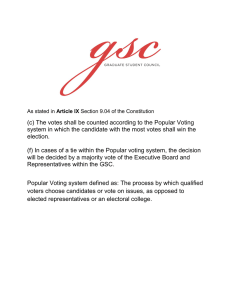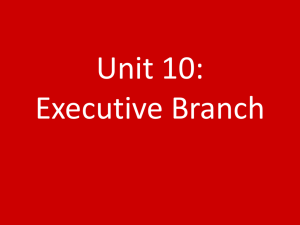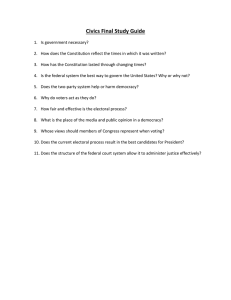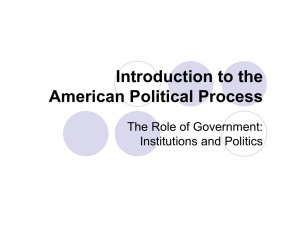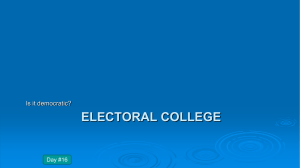COMMUNITY IMPACT ASSESSMENT SCREENING PROCESS Person(s) responsible for the assessment
advertisement
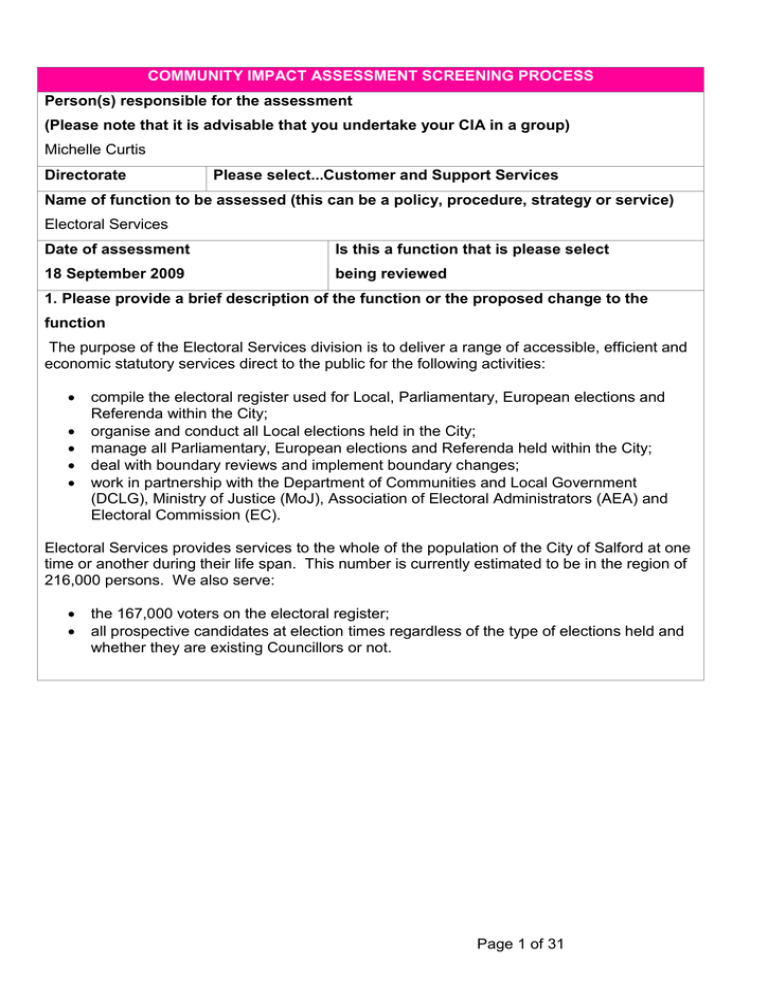
COMMUNITY IMPACT ASSESSMENT SCREENING PROCESS Person(s) responsible for the assessment (Please note that it is advisable that you undertake your CIA in a group) Michelle Curtis Directorate Please select...Customer and Support Services Name of function to be assessed (this can be a policy, procedure, strategy or service) Electoral Services Date of assessment Is this a function that is please select 18 September 2009 being reviewed 1. Please provide a brief description of the function or the proposed change to the function The purpose of the Electoral Services division is to deliver a range of accessible, efficient and economic statutory services direct to the public for the following activities: compile the electoral register used for Local, Parliamentary, European elections and Referenda within the City; organise and conduct all Local elections held in the City; manage all Parliamentary, European elections and Referenda held within the City; deal with boundary reviews and implement boundary changes; work in partnership with the Department of Communities and Local Government (DCLG), Ministry of Justice (MoJ), Association of Electoral Administrators (AEA) and Electoral Commission (EC). Electoral Services provides services to the whole of the population of the City of Salford at one time or another during their life span. This number is currently estimated to be in the region of 216,000 persons. We also serve: the 167,000 voters on the electoral register; all prospective candidates at election times regardless of the type of elections held and whether they are existing Councillors or not. Page 1 of 31 2. What are the aims of the service, strategy, policy or procedure? It is important to get this right as they will be the focus of the EqIA The Electoral Services division is committed to providing a high quality registration service and electoral service to all residents and candidates. We aim to make the electoral processes accessible to everyone and to encourage all members of the public to participate in the electoral process. We aim to ensure that emphasis is given to providing equal access to all citizens whatever their background and we are committed to setting objectives to comply with the authority’s Integrated Equal Opportunities policy, legislative Equalities requirements and the Electoral Administration Act 2006 (which has a strong focus on Equalities issues). The provision of Electoral Services is a statutory requirement contained in the Representation of the People Legislation. Our key functions are: Compilation, publication, distribution and maintenance of Register of Electors Plan and deliver General, European Parliament, Salford City Council, Local elections and referenda Identify and review appropriate buildings for Polling that meet all requirements including Disability Discrimination Act, Equalities stakeholders and users Provision of guidance and training for candidates and their agents Provision of information to voters with regard to forthcoming elections Ensure compliance with new statutory requirements (e.g. with regard to postal voting, increased polling hours, changes to the election timetable, anti fraud and risk management measures) 3. If you are considering a strategy or service, please list any related policies Salford City Council’s Integrated Equal Opportunities Policy Salford City Council’s Complaints, Compliments and Comments Policy Representation of the People Acts Electoral Administration Act 2006 Page 2 of 31 4. Please list any group who has an interest in or who will benefit from the function (this can include service users, stakeholders, beneficiaries). Members of the Public – to ensure that all eligible electors are registered on the Register of Electors and are able to exercise their democratic right to vote. Elected Representatives – to facilitate MP’s, MEP’s and Local Councillors to be able to stand at an election and provide them with their copy of the Register of Electors and postal vote lists. Electoral Commission – requires local authorities to fulfil their statutory duty to provide information and statistics on electoral matters to enable the Commission to modernise the electoral process by working with the Government and others to develop a long-term strategy for how elections will be run in the future. Her Majesty’s Court Service (HMCS) - requires local authorities to fulfil their statutory duty to supply a full copy of the register of electors to enable the Court Service to appoint members of the public for jury service. 5. Please list any aspects of your service or policy which are delivered externally or with external partners. Electoral Registration System – Computershare Printing of Ballot Papers - Print image Network Ltd Printing of Canvass Forms – Electoral Reform Services Delivery of Portable Polling Stations – A-Plant Delivery of Postal Votes – Royal Mail 6. Is there any evidence of higher or lower participation or uptake by different groups? Socioeconomic don’t know Age yes Religion & Belief no Disability yes Sexual Identity no Gender don’t know Race yes 7. Is there any evidence that different groups have different needs, experiences, issues and priorities in relation to this function? Socioeconomic yes Race yes Age yes Religion & Belief don’t know Disability yes Sexual Identity no Gender no Page 3 of 31 8. Is there an opportunity to better promote equality and diversity or better community relations for the following groups, by working with others? e.g. partners, community and voluntary groups Socioeconomic don’t know Race yes Age yes Religion & Belief yes Disability yes Sexual Identity don’t know Gender yes 9. Have consultations with relevant groups, organisations or individuals indicated that this policy creates problems that are specific to them? Socioeconomic don’t know Age yes Religion & Belief don’t know Disability yes Sexual Identity no Gender no Race yes If your have answered ‘yes’ to the last four sections you will need to complete the rest of the form, If you have answered ‘no’ to them please complete the next box and return to your Directorate Equality Lead Officer. Comments Date sent to Directorate Lead Equality Officer Screening received and reviewed by Directorate Lead Equality Officer Name Date Signed Page 4 of 31 FULL COMMUNITY IMPACT ASSESSMENT Narrowing the gap – socio- economic inequality Please consider the following areas… please click here 1. How does the service support our ambition to ‘narrow the gap’ and reduce the extent to which outcomes are dependent on wealth? When organising elections and electoral registration consideration is given to the social surroundings of the City. Where possible, we try to procure the services of local businesses for those aspects of the job which are delivered externally. For example, we employ local printers (based in Stockport) to print all our ballot papers and employ a local equipment rental company (based in Salford) to deliver our portable polling stations. 2. Please list any barriers which may prevent people from low income backgrounds from achieving positive outcomes from the function Electors might not be able to travel to polling stations and are therefore unable to exercise their democratic right to vote. Electors can not afford to return their registration forms, which results in their name being omitted form the register of electors, which then leads to people experiencing difficulty in obtaining credit. Electors who have literacy problems could struggle to complete their annual registration form and postal ballot paper. Page 5 of 31 3. Please detail how these barriers may be overcome. When relocating polling stations and establishing new ones consideration is given to the proximity of polling stations in relation to housing estates to ensure all polling stations are within walking distance to alleviate the need to travel by car, bus or taxi and are therefore convenient and accessible to all. Pre-paid return envelopes are supplied with all registration forms and postal / proxy vote application forms, subsequently there is no cost to the elector. In addition, at the annual register of electors canvass, where a household has no changes to the property, as well as being able to register by returning the form, electors also have the option to register by telephone, internet, or sms text messaging. Arrangements have been made with the Housing Offices for housing staff to complete a rolling registration form with new tenants when they sign their tenancy agreement, and forms are then forwarded to the electoral services division for processing. As part of the annual canvass process, each year personal visits are made to every nonresponding property which means that electors that have literacy problems will be helped to complete their forms by a personal canvasser. In addition, at election time those electors who have a postal vote and inadvertently spoil or misplace their ballot paper can contact the electoral services division to request assistance from a member of staff. 4. Please list any baseline data and analysis which demonstrates our knowledge of communities in Salford and the impact of deprivation The Salford Information Observatory contains the annual Government produced Index of Multiple Deprivation (IMD) results and Salford's IMD analysis report which contains scores and rankings for all of Salford's 20 ward areas based on the key domains of income, employment, health, education skills & training, crime, housing, and the living environment. 5. Please provide evidence of how services are targeted or designed based on our knowledge of need and deprivation As above. If your policy is relevant to narrowing the gap, please continue to complete this section. 6. Please list any data or evidence you have which demonstrates access of service and benefits N/A 7. Does this data show that any groups access the service more/less? N/A Page 6 of 31 8. Does this data show any better or worse outcomes are achieved from the service for this group? N/A 9. Can any unfavourable impacts be justified? N/A Age Please consider the following areas… please click here 1. Please list any barriers which may prevent people from achieving positive outcomes from the service as a result of their age Problems trying to include 16/17 year olds on to the register. Low registration levels and voting levels among younger people. Lack of awareness to register with older people. Time constraints imposed on middle aged people may result in them not exercising their democratic right to vote. Middle aged people may be busy and require postal votes. Younger people may be hesitant to stand as a candidate at an election. Page 7 of 31 2. Please detail how these barriers may be overcome. Work with local schools, via citizenship classes, to identify how voting and registration is currently delivered in schools; look at ways in which it can be developed in line with the school curriculum and produce lesson plans with the aim of informing students of the importance of registration and voting and encourage them to participate in the democratic electoral process. Each year contact is made with the University of Salford accommodation office to establish the details of all students residing in student accommodation to ensure all eligible electors are registered in the City. Arrangements have been made with the Housing Offices for housing staff to complete a rolling registration form with new tenants when they sign their tenancy agreement, and forms are then forwarded to the electoral services division for processing. When a person moves into Salford, the Customer Contact Centre send “Welcome to Salford Services Notification" emails to the elections generic inbox informing us of the name and address of the resident, to which we respond by sending rolling registration forms out to the new occupiers. The Salford Elections Website has been updated to enable residents to download a rolling registration form and postal / proxy vote application form for completion. Residents of Salford can access the council website in all libraries, gateway centres and the main central reception at Salford Civic Centre. At the annual register of electors canvass, where a household has no changes to the property, as well as being able to register by returning the form, electors also have the option to register by telephone, internet, or sms text messaging. The provision of postal voting is encouraged, to assist those electors who are unable to get to the polling station for any reason, or simply because it is more convenient. At each election all associated deadlines are publicised in Salford’s “LIFE IN Salford” magazine, this includes registration, postal voting and proxy voting deadlines. In addition, the annual canvass registration form includes a section on postal voting. Arrange an open evening designed to outline to prospective candidates what the role of a councillor involves and to give an overview of the process involved in becoming elected, with the aim of attracting a good variety of people representing all ages and backgrounds to become a councillor to enable a true representation of the diversity within the City. The Electoral Administration Act 2006 introduced a new age for candidates from 21 to 18 years old in a bid to get younger people represented in local government. Page 8 of 31 3. Please list any baseline data or evidence you have e.g. census data Reports by bodies including the Electoral Commission, Age Concern, DCLG and ICM: EC (2002), Voter Engagement and Young People - low registration and poor voter turnout in the 18 – 25 year old category. Youth Voting Network (2003), A young person’s agenda for democracy – one year on EC + ICM (2008), Local Elections 2008 Summary - public opinions EC (2004), Age of Electoral Majority EC (2004), An Audit of Political Engagement Age Concern (2004), Looking beyond the grey DCLG (2007), Research Report 1 – incentives and barriers to becoming and remaining a Councillor – A review of the UK Literature DCLG (2007), Research Report 2 – understanding the barriers and incentives to becoming and remaining a Councillor in England Information received from Political Parties and Councillors (representing local people’s views) from the annual Polling District / Polling Place Review. 4. Please list any data or evidence you have which demonstrates service users accessing the service Completed Canvass Registration Forms Completed Rolling Registration Forms Completed Postal / Proxy Vote Application Forms The Full Register of Electors – Register of Electors Marked Register of Electors - Elections Marked Postal Vote Lists – Elections Nomination Papers and Candidate’s Consent to Nomination Various Emails received in the elections generic inbox 5. Does this data show that any groups access the service more/less? Information on age groupings is not required to be collected – prevented by the Representation of the People Acts and Data Protection. 6. Does this data show any better or worse outcomes are achieved from the service for this group? The Electoral Commission’s Evaluation Reports shows that young people are the most likely of all age groups not to be registered to vote. Statistics show that the average age for a Councillor is 58 with more than 50% over 60 compared with just 0.3% under 25 and fewer than 8% under 40. Page 9 of 31 7. Can any unfavourable impact be justified? Reports show that young people are the most likely of all age groups not to be registered, but as individuals can not be automatically registered (the law states it is down to individuals to register to vote), we can only try to emphasise to individuals the importance of registering which will then enable them to vote if they wish to do so. Every household is sent an annual canvass registration form listing all the people currently on the electoral register at their property and therefore everyone has the opportunity to register. In addition, the annual canvass registration form includes a section on 16/17 year olds. Disability Please consider the following areas… please click here 1. Please list any barriers which may prevent people with disabilities from achieving positive outcomes from the service. Problems accessing polling stations with no disabled access. Problems voting independently. Unable to complete postal vote application form. Unable to complete annual canvass registration form. Page 10 of 31 2. Please detail how these barriers may be overcome. When relocating polling stations and establishing new ones consideration is given to access and equality issues and also facilities available. At every election polling station inspectors are employed on polling day to visit polling stations to ensure the layout is correct, the polling station is clearly marked and notices are displayed for all to see. In addition to this, it is the station inspector’s duty to undertake an access and equality assessment of each polling station, which includes checking car parking facilities, signage, entrances, layout inside the polling station and ensuring the large print ballot paper and tactile template are clearly visible and available. Every polling station is supplied with signage and information in appropriate formats and is easily accessible to all electors. At each polling station, the following is available: Provision of low level voting booth suitable for wheelchair users Large print version of ballot paper Tactile voting device for the visually impaired Magnifying device for use with the ballot paper Guidance is provided to voters in polling stations who require further assistance on the grounds of blindness or other physical incapacity and who cannot read (Either by the polling staff or via a companion) Notices displayed at a suitable height Party logos are printed on the ballot papers to aid people Where forms are classified as ‘not prescribed’ we ensure that forms are in a clear, easy-to-read format and consideration is given to the size and type of font used, layout, use of colour and language. The need to provide a signature on postal vote application forms and postal voting statements is removed for applicants who have a disability or cannot read or write. When producing posters / leaflets, poll cards or any printed information, the RNIB guidance is adhered to, to assist electors in the completion of forms and help understand what information is required and why. Written and pictorial instructions are provided with the postal vote ballot packs as to the steps electors need to follow to complete their postal vote. In addition guidance notes are published on Salford City Councils electoral webpage’s which include a frequently asked questions document relating to the annual canvass, a written guide explaining about the requirements of the annual canvass and a pictorial guide on how to complete the canvass form. Page 11 of 31 Residents of Salford can access the council website in all libraries, gateway centres and the main Central reception at Salford Civic Centre. “Aboutmyvote” website is used to obtain the “How to vote” leaflet for persons with low literacy levels or learning disabilities. All outgoing communication provides the contact details of the local office to allow interested parties to respond and find out further information. Contact details (website/telephone numbers/email address/postal address) can be found on rolling registration forms, annual canvass forms, absent voting forms and on all letters issued to electors. As part of the annual canvass process, each year personal visits are made to every nonresponding property which means that electors that have literacy problems will be helped to complete their forms by a personal canvasser. In addition, at election time those electors who have a postal vote and inadvertently spoil or misplace their ballot paper can contact the electoral services division to request assistance from a member of staff. Equality and diversity awareness and customer care training is provided to all front line electoral staff. 3. Please list any baseline data or evidence you have e.g. census data Reports by bodies including the Electoral Commission and Scope: EC (2003), Equal Access to Democracy EC (2005), Understanding electoral registration (non-registration in Britain) Scope (2005), DDA compliance / non compliance Scope (2005), Difficulties in registering and voting Scope (2002 – 2005), Polls Apart reports – experiences Information received from Political Parties and Councillors (representing local people’s views) from the annual Polling District / Polling Place Review. Page 12 of 31 4. Please list any data or evidence you have which demonstrates service users accessing the service Declarations by companion of voter with disabilities List of voters with disabilities assisted by companions List of Votes marked by Presiding Officer Statement of Number of Votes marked by the Presiding Officer Completed Canvass Registration Forms Completed Rolling Registration Forms Completed Postal / Proxy Vote Application Forms Marked Register of Electors - Elections Marked Postal Vote Lists - Elections Various Emails received in the elections generic inbox 5. Does this data show that any groups access the service more/less? There are no comparable indicators of disability breakdown to provide measurement of success or not of the service provided through the registration / absent voting process, although postal vote rates have increased significantly. 6. Does this data show any better or worse outcomes are achieved from the service for this group? Scope reports show that people with disabilities are more likely to vote if polling stations are DDA compliant. 7. Can any unfavourable impact be justified? It is almost impossible to achieve a 100% access compliance rate in relation to polling stations as there is a general lack of public buildings that are available. In a number of areas there are no alternative buildings to the one that is used as a polling station and therefore there is no other option but to use some locations that have accessibility issues. This factor is recognised in the Electoral Administration Act 2006 (legislation which requires all local authorities to review their polling districts, polling places and polling stations every four years). Section 18B of the Electoral Administration Act 2006 states “the authority must seek to ensure that so far as is reasonable and practicable every polling place for which it is responsible is accessible to electors who are disabled”. Gender Please consider the following areas… please click here Page 13 of 31 1. Please list any barriers which may prevent people from achieving positive outcomes from the service as a result of their gender Time constraints imposed on single parents may result in them not exercising their democratic right to vote. Women who marry may forget to change their name on the Register of Electors and thus cause a problem at election time. Individuals who transition from one gender to another may forget to change their name on the Register of Electors and thus cause a problem at election time. Individuals who suffer domestic violence may be reluctant to add their name onto the register and thus lose their entitlement to vote. Women may be hesitant to stand as a candidate at an election. Page 14 of 31 2. Please detail how these barriers may be overcome. At the annual register of electors canvass, where a household has no changes to the property, as well as being able to register by returning the form, electors also have the option to register by telephone, internet, or sms text messaging. The provision of postal voting is encouraged, to assist those electors who are unable to get to the polling station for any reason, or simply because it is more convenient. At each election all associated deadlines are publicised in Salford’s “LIFE IN Salford” magazine, this includes registration, postal voting and proxy voting deadlines. In addition, the annual canvass registration form includes a section on postal voting. When a person contacts the Council Tax section via the Customer Contact Centre, we receive notification emails to the elections generic inbox informing us of the name and address of the resident, to which we respond appropriately. In addition, when any name changes are made to the annual canvass registration form we operate good practice by checking if the elector is in receipt of a postal vote and then issue a fresh application to the elector in order to keep their postal vote personal identifier up to date (signature and date of birth). Transgender people are dealt with positively in terms of changing their status on the electoral roll. When an individual who transitions from one gender to another contacts the electoral registration office to change their name on the Register of Electors, the elector is requested to write a letter and provide a copy of the relevant legal documentation, as is the case when an elector changes their name due to marriage. On receipt of the letter and legal documentation the elector’s details are amended on the Register of Elector to reflect the elector’s new identity. Individuals can now formally apply to be placed on the register of electors as anonymous electors. This facility is available to electors who believe their safety is at risk and /or for those people escaping from domestic violence. Anonymous registration means that that a person’s name will not appear on the register but they can still vote. Arrange an open evening designed to outline to prospective candidates what the role of a Councillor involves and to give an overview of the process involved in becoming elected, with the aim of attracting a good variety of people representing all ages and backgrounds to become a Councillor to enable a true representation of the diversity within the City. Page 15 of 31 3. Please list any baseline data or evidence you have e.g. census data Reports by bodies including the Electoral Commission and Department of Communities and Local Government: EC (2004), Gender and Political Participation EC (2004), An Audit of Political Engagement DCLG (2007), Research Report 1 – incentives and barriers to becoming and remaining a Councillor – A review of the UK Literature DCLG (2007), Research Report 2 – understanding the barriers and incentives to becoming and remaining a Councillor in England 4. Please list any data or evidence you have which demonstrates service users accessing the service Completed Canvass Registration Forms Completed Rolling Registration Forms Completed Postal / Proxy Vote Application Forms The Full Register of Electors – Register of Electors Marked Register of Electors - Elections Marked Postal Vote Lists – Elections Nomination Papers and Candidate’s Consent to Nomination Various Emails received in the elections generic inbox 5. Does this data show that any groups access the service more/less? Breakdown between genders is not available. However it could be researched by undertaking a laborious manual count of all the voters included in the Register of Electors. 6. Does this data show any better or worse outcomes are achieved from the service for this group? National research suggests that there is only a marginal gender gap in voter turnout with men more likely to vote than the female, nevertheless research shows that women are significantly less likely than men to participate in campaign orientated activities such as party membership, party donations and contacting politicians. Statistics show that fewer than 3 in 10 Councillors are women. 7. Can any unfavourable impact be justified? No Race Please consider the following areas… please click here Page 16 of 31 1. Please list any barriers which may prevent people from achieving positive outcomes from the service as a result of their race Unable to complete annual canvass registration form – due to language barriers, when English is second language. Low registration levels and voting levels among BME community. Lack of awareness to register within BME community. Problems understanding the voting process. European Union citizens unaware of the registration and voting process. BME community may be hesitant to stand as a candidate at an election. Page 17 of 31 2. Please detail how these barriers may be overcome. Contact is made with the Salford Link project to establish the top 10 nationalities within Salford, to enable the telephone registration service to be provided in 9 other languages appropriate to the local authority (Arabic, Bengali, Farsi, Hindi, Polish, Portuguese, Punjabi, Slovak and Urdu). Staff training materials are provided to doorstep canvass staff including translation documents on the “Purpose of the canvass” in Arabic, Bengali, Polish, Punjabi and Urdu. In addition, where necessary we use language interpreters employed by the council, to contact any householders who have difficulties in understanding the registration form. Electoral Services participate in appropriate initiatives with minority ethnic groups to provide guidance and information on voting and registration. As part of SNAP week an ‘elections in the United Kingdom’ PowerPoint presentation was produced and translated, which was used at a diversity event in April this year to explain and encourage voting in the BME community. Arrangements have been made with the Housing Offices for housing staff to complete a rolling registration form with new tenants when they sign their tenancy agreement, and forms are then forwarded to the electoral services division for processing. Additionally arrangements are in place with Registrars to issue rolling registration forms at Citizenship Ceremonies. When a person moves into Salford, the Customer Contact Centre send “Welcome to Salford Services Notification" emails to the elections generic inbox informing us of the name and address of the resident, to which we respond by sending rolling registration forms out to the new occupiers. The Salford Elections Website has been updated to enable residents to download a rolling registration form and postal / proxy vote application form for completion. Residents of Salford can access the council website in all libraries, gateway centres and the main central reception at Salford Civic Centre. At election time the Electoral Commission’s ‘how to vote’ leaflets are available at all Polling Stations in the City (in Arabic, Bengali, Hindi and Urdu), and the Directions for Guidance to Voters is produced in Polish (no EC leaflet available). When sending out the Electoral Commission’s European Parliament voter registration forms to all European Union Citizen electors, application forms were issued in the different languages. Arrange an open evening designed to outline to prospective candidates what the role of a Councillor involves and to give an overview of the process involved in becoming elected, with the aim of attracting a good variety of people representing all ages and backgrounds to become a Councillor to enable a true representation of the diversity within the City. Page 18 of 31 3. Please list any baseline data or evidence you have e.g. census data Reports by bodies including the Electoral Commission and Department of Communities and Local Government: EC (2002), Voter Engagement among black and minority ethnic communities EC (2004), An Audit of Political Engagement EC (2005), Understanding electoral registration (non-registration in Britain) DCLG (2007), Research Report 1 – incentives and barriers to becoming and remaining a Councillor – A review of the UK Literature DCLG (2007), Research Report 2 – understanding the barriers and incentives to becoming and remaining a Councillor in England 4. Please list any data or evidence you have which demonstrates service users accessing the service Completed Canvass Registration Forms Completed Rolling Registration Forms Completed Postal / Proxy Vote Application Forms Completed European Parliament voter registration forms The Full Register of Electors – Register of Electors Marked Register of Electors - Elections Marked Postal Vote Lists – Elections Nomination Papers and Candidate’s Consent to Nomination Various Emails received in the elections generic inbox 5. Does this data show that any groups access the service more/less? Information not required to be collected – prevented by the Representation of the People Acts and Data Protection. However it is possible to record nationalities - as a comparator this method may not provide any realistic comparison, other than against languages. 6. Does this data show any better or worse outcomes are achieved from the service for this group? The Electoral Commission’s research shows that some BME communities are less likely to be registered than others. Black African and Chinese groups, for example, are less likely to be registered overall, whereas other Asian groups are as likely to be registered as White people. Statistics show that just 4% of Councillors are from BME backgrounds. Page 19 of 31 7. Can any unfavourable impact be justified? It should be noted that only British, Irish, Commonwealth and European Union Citizens or British Overseas Territories are eligible to register. Citizens of other countries resident within the City do not qualify for registration under current legislation. For example: China, The Philippines, Turkey, USA etc. Some groups may not understand election material, but the law requires that they are provided in English and follow prescribe wording on some forms. However where possible translations are made available. Religion and/or Belief Please consider the following areas… please click here 1. Please list any barriers which may prevent people from achieving positive outcomes from the service as a result of their religion and or belief Voting requirements can conflict with Cultural Norms. Choice of venue for polling station is unsuitable and electors are therefore unable to vote in person. Not able to participate in electoral matters on certain days of the week or at certain times of the year. Page 20 of 31 2. Please detail how these barriers may be overcome. Continue to participate in appropriate initiatives with minority ethnic groups to provide guidance and information on voting and registration. As part of SNAP week an ‘elections in the United Kingdom’ PowerPoint presentation was produced and translated, which was used at a diversity event in April this year to explain and encourage voting in the BME community. A prayer room was made available at the event to accommodate those attendees to engage in meditation, worship and prayer. The diversity event was a useful way to deliver the message that it is not acceptable for a persons vote to be determined by an elder or partner and that it is an offence to use a ballot paper addressed to another person. Electoral forms request individuals to add their forename or first name, thus recognising the different religions by not requesting Christian names. When relocating polling stations and establishing new ones consideration is given to the choice of venue used, and where possible, polling stations are not held in a consecrated building, as this may prevent certain faith groups from casting a vote. If an alternative polling station is not available then all electors are wrote to in advance of an election advising them of the location of the polling station and offering them the opportunity to vote by post. When conducting the annual canvass, consideration of the interfaith calendar is taken into account. As the annual canvass is undertaken between the months of August and October the holidays / observances which fall within these months are in relation to the Jewish and Islamic religions. Therefore canvassers are provided with dates of the Jewish and Islamic holidays and informed them that they should avoid visiting or contacting households on the dates provided. 3. Please list any baseline data or evidence you have e.g. census data Reports by bodies including the Electoral Commission and Joseph Rowntree Foundation: EC (2002), Voter Engagement among black and minority ethnic communities EC (2005), Understanding electoral registration (non-registration in Britain) EC (2005), Black and Minority Ethnic Survey Joseph Rowntree Foundation (2008), Electoral Participation of Hindu and Sikh Communities in England and Wales Page 21 of 31 4. Please list any data or evidence you have which demonstrates service users accessing the service Completed Canvass Registration Forms Completed Rolling Registration Forms Completed Postal / Proxy Vote Application Forms Marked Register of Electors - Elections Marked Postal Vote Lists – Elections Various Emails received in the elections generic inbox 5. Does this data show that any groups access the service more/less? Information not required to be collected – prevented by the Representation of the People Acts and Data Protection. Not specifically relevant to Electoral Services, other than in terms of culture. 6. Does this data show any better or worse outcomes are achieved from the service for this group? No 7. Can any unfavourable impact be justified? N/A Sexual Identity Please consider the following areas… please click here 1. Please list any barriers which may prevent people from achieving positive outcomes from the service as a result of their sexual identity N/A – not relevant to providing an electoral service to the customer. 2. Please detail how these barriers may be overcome. N/A – see remarks made in 1. 3. Please list any baseline data or evidence you have e.g. census data N/A – see remarks made in 1. 4. Please list any data or evidence you have which demonstrates service users accessing the service Information not required to be collected - not relevant to Electoral Services. 5. Does this data show that any groups access the service more/less? Not relevant to providing an Electoral Service to the customer. 6. Does this data show any better or worse outcomes are achieved from the service for this group? N/A Page 22 of 31 7. Can any unfavourable impact be justified? N/A Community Cohesion Please consider the following areas… please click here 1. Does the function promote/support community cohesion? Yes the Electoral Services Division of Democratic Services actively promotes positive interaction between people from different backgrounds. 2. If community cohesion is relevant to your function what steps will you take to promote it? Efforts are made to ensure involvement and participation with a very diverse community. Local Democracy Day is an opportunity to engage with the local community and raise the profile of the democratic decision-making process and the Council in general. To engage the electorate Electoral Services is actively involved in the “Salford Garden Party” which is Salford City Council’s democracy day, and at various local festivals throughout the year. An electoral stand is set up providing the electorate with various information on elections and electoral registration, and staff are at hand to answer any queries that the public may have. Arrange an open evening designed to outline to prospective candidates what the role of a Councillor involves and to give an overview of the process involved in becoming elected, with the aim of attracting a good variety of people representing all ages and backgrounds to become a Councillor to enable a true representation of the diversity within the City. When undertaking the statutory review of polling districts, polling places and polling stations within the City, reports were submitted to all 8 Community Committees to actively seek comments and suggestions on polling arrangements within the respective areas. Page 23 of 31 Consultation – Planning Who are the groups, organisations and individual most likely to be affected by the proposed policy, directly and indirectly? Younger People, People with Disabilities, the BME Community and Candidates. What methods of consultation are most likely to succeed in attracting the organisations and people you want to reach? Feedback from younger people through citizenship work Access and Equality Polling Station Reports Feedback from the BME Community at diversity events Polling District Review Public Meetings (Community Committees) Has there been any recent research or consultation with the group/individuals you plan to consult? (please give details) Access and Equality Polling Station Reports (Internal) Members Customer Satisfaction Survey (Internal) Polling District Review (Internal) The Big Listening 7 Survey (Internal) Voter Engagement and Young People - low registration and poor voter turnout in the 18 – 25 year old category (External) Voter Engagement among black and minority ethnic communities (External) Consultation- results When did you undertake the consultation? June 2009 - Access and Equality Polling Station Reports January 2008 - Members Customer Satisfaction Survey July – November 2007 – Statutory Polling District Review July 2009 - Polling District Review March 2008 – The Big Listening 7 Survey October 2002 -Voter Engagement and Young People - low registration and poor voter turnout in the 18 – 25 year old category October 2002 - Voter Engagement among black and minority ethnic communities Page 24 of 31 Did you reach all the groups/individuals you wanted to reach? Yes What did you find? Access and Equality Polling Station Reports – A wheelchair user can not gain easy access to some polling stations as not all buildings have a suitable ramp clear of obstruction. Inside some polling stations lighting is a problem. Not all polling stations have car park spaces close to the polling station entrance. Members Customer Satisfaction Survey – Requested a dedicated website with all information on about voting and registration. Reported that the quality of some of the marked register of electors is unacceptable. Statutory Polling District Review – After publishing consultation documents at council offices, libraries, the Council’s website and the Elections Office, as well as submitting reports to all 8 Community Committees, 21 responses were received from various correspondents to move the polling places in polling districts Winton CD; Eccles EA; Eccles EE; Swinton South FC; Ordsall PC; Ordsall PF; Irwell Riverside RH; Irwell Riverside RL; Weaste & Seedley TC; Weaste & Seedley TH and Weaste & Seedley TI. Page 25 of 31 The Big Listening 7 Survey – Almost three-quarters (73%) say that they do regularly vote in the local elections; 25% do not The main reasons why respondents do not vote at the local elections are because they are unsure if the issues/who is running (27%) and due to apathy (24%). Of those who do not currently vote in the local elections, around half (52%) say that they would be encouraged to vote if they had more information on the candidates, while a quarter think it should be made easier to register to vote (29%) and easier to get to the polling stations (23%). A fifth (19%) say that nothing would encourage them to vote at the local elections. Around a fifth of those who do not vote regularly say that they are not registered to vote because they do not know how to register (20%) or they did not know they had to register (18%) October 2002 - Voter Engagement and Young People - low registration and poor voter turnout in the 18 – 25 year old category Young people are some of the people least likely to turn out and vote. In 2001 MORI estimates that only 39% of 18 – 24 year olds voted, compared to 70% of those aged 65. Young people are the most likely of all age groups not to be registered to vote. The numbers of unregistered voters may be as high as 15% of the eligible electorate in some constituencies and higher among certain age groups. Reasons for not registering to vote include: ignorance, administrative inefficiency, having recently moved, alienation from the political system and deliberate avoidance of registration in relation to the secondary uses of the register. October 2002 - Voter Engagement among black and minority ethnic communities Research shows that some BME communities are less likely to be registered than others. Black African and Chinese groups, for example, are less likely to be registered overall, whereas other Asian groups are as likely to be registered as White people. Statistics show that just 4% of Councillors are from BME backgrounds. Page 26 of 31 What will you change as a result of the consultation? Please ensure this is captured in the action plan Communicate with High Schools via citizenship classes, to identify how voting and registration is currently delivered in schools; look at ways in which it can be developed in line with the school curriculum and produce lesson plans with the aim of informing students of the importance of registration and voting and encourage them to participate in the democratic electoral process. Arrange an open evening designed to outline to prospective candidates what the role of a Councillor involves and to give an overview of the process involved in becoming elected, with the aim of attracting a good variety of people representing all ages and backgrounds to become a Councillor to enable a true representation of the diversity within the City. Ensure Canvassers are fully trained and equipped in undertaking their role at the annual register of electors canvass. Liaise with Government Department and the Electoral Commission to propose changes to the wording of prescribed forms. Page 27 of 31 Action Plan following consultation Please list issues identified from targeted consultation and actions required Issue identified Action required Person Responsible Low registration levels Communicate with High Electoral Date required by Outcome Services December 2011 and voting levels among Schools and Sixth Form Staff year olds. younger people. Colleges. Lack of Councillors in Arrange open evening Electoral different groups for Services May 2010 prospective Staff To attract a good variety of people candidates representing all ages, gender and backgrounds. Wording on prescribed Liaise with Government Electoral forms can create Department problems for certain Electoral Commission and Services December 2011 the Staff To ensure forms take into account those religions who do not have first name / surname but groups Personal Canvassers Increased participation of 18 – 25 religious names instead. Train Canvassers need to be able to assist supply them an Electoral Services December 2010 with Staff and Canvassers all groups in completing appropriate tools, i.e their canvass translation documents registration form and magnifying device Establish an all-inclusive personal canvass to remove barriers which may prevent registering. Page 28 of 31 people from Polling stations are not Review Polling Stations accessible to all Electoral Services December 2010 Staff All Polling assessed. Stations For those to be with accessibility issues, ensure that there is no alternative available in the area. Please ensure you have provided as much evidence as possible to support the responses you have given Additional Comments Monitoring How and when will the action plan be monitored? In line with the target deadlines, it seems appropriate to review the action plan on a 6 month basis. The action plan will be monitored at Democratic Services Weekly Briefing Meetings. How and when will outcomes be recorded? All issues identified will be recorded formally on completion of each action. Evidence to demonstrate that the actions have been undertaken are as follows: Communication with High Schools – formal lesson plans developed Open Evening for Prospective Candidates – Power Point Presentation produced Liaise with Government and Electoral Commission – Letters / Emails Train Canvassers – Power Point Presentation produced, together with Procedural Manual / Instructions Review Polling Districts – Letters / Emails to Members and Reports to Council Page 29 of 31 With whom will the results of the EqIA be shared? The Returning Officer and Electoral Registration Officer Democratic Services Manager Members of the Council Equalities and Cohesion Team Have the actions been mainstreamed into the service plan? Yes Quality Assurance When you have completed your EqIA, it must be submitted to your directorate EqIA Quality Assurance Panel for approval. Signed Dated (Completing Officers) Dated Signed Dated (Lead Officer) Signed Dated (Quality Assurance Panel) Dated Dated Dated Page 30 of 31 This EqIA must be reviewed every three years. EqIA review date: Please send your approved EqIA along with an EqIA narrative to elaine.barber@salford.gov.uk, for publishing on the council’s internet pages. Page 31 of 31



